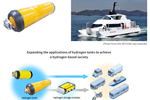Toyoda Gosei develops seawater-derived fiber-reinforced material
Fiber reinforcement is formed from magnesium hydroxide derived from seawater, achieving plastic parts that contributed to improved environmental performance.
Toyoda Gosei Co. Ltd. (Kiyosu, Japan) has developed a lightweight material reinforced with fibers that use magnesium hydroxide derived from seawater, in its decarbonization efforts to create lighter weight products leveraging its plastic and rubber materials technology.
In this new plastic material, a magnesium compound derived from seawater is mixed as part of the reinforcing material into a general purpose plastic (polypropylene) used in interior and exterior products. The magnesium compound is fibriform, and so provides greater reinforcement than the previous material (talc), according to the company. As a result, the amount of reinforcing material can be reduced by half, while retaining the same quality as before, contributing to improved environmental performance of vehicles during operation. Another property of the new material is that scratches are less noticeable. This eliminates the need for paint to protect the surface on some products, contributing to a reduction in CO2 during manufacture; Toyoda Gosei cites that in some products, CO2 can be reduced by as much as 70%.
Related Content
-
European boatbuilders lead quest to build recyclable composite boats
Marine industry constituents are looking to take composite use one step further with the production of tough and recyclable recreational boats. Some are using new infusible thermoplastic resins.
-
Biomaterials make strides toward composites sustainability
A compilation of trends in development or application of natural fibers, bio-based resins and more showcases industry players, educational institutes and global projects.
-
NASCAR unveils BEV prototype featuring natural fiber bodywork
Implementation of Bcomp technical flax fibers in a U.S. motorsport first represents NASCAR’s step toward more sustainable competition vehicles.













